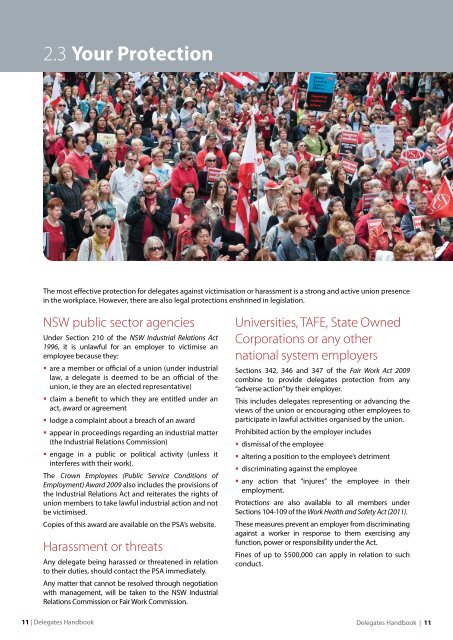Delegates Handbook
delegates_handbook
delegates_handbook
You also want an ePaper? Increase the reach of your titles
YUMPU automatically turns print PDFs into web optimized ePapers that Google loves.
2.3 Your Protection<br />
The most effective protection for delegates against victimisation or harassment is a strong and active union presence<br />
in the workplace. However, there are also legal protections enshrined in legislation.<br />
NSW public sector agencies<br />
Under Section 210 of the NSW Industrial Relations Act<br />
1996, it is unlawful for an employer to victimise an<br />
employee because they:<br />
• are a member or official of a union (under industrial<br />
law, a delegate is deemed to be an official of the<br />
union, ie they are an elected representative)<br />
• claim a benefit to which they are entitled under an<br />
act, award or agreement<br />
• lodge a complaint about a breach of an award<br />
• appear in proceedings regarding an industrial matter<br />
(the Industrial Relations Commission)<br />
• engage in a public or political activity (unless it<br />
interferes with their work).<br />
The Crown Employees (Public Service Conditions of<br />
Employment) Award 2009 also includes the provisions of<br />
the Industrial Relations Act and reiterates the rights of<br />
union members to take lawful industrial action and not<br />
be victimised.<br />
Copies of this award are available on the PSA’s website.<br />
Harassment or threats<br />
Any delegate being harassed or threatened in relation<br />
to their duties, should contact the PSA immediately.<br />
Any matter that cannot be resolved through negotiation<br />
with management, will be taken to the NSW Industrial<br />
Relations Commission or Fair Work Commission.<br />
Universities, TAFE, State Owned<br />
Corporations or any other<br />
national system employers<br />
Sections 342, 346 and 347 of the Fair Work Act 2009<br />
combine to provide delegates protection from any<br />
“adverse action” by their employer.<br />
This includes delegates representing or advancing the<br />
views of the union or encouraging other employees to<br />
participate in lawful activities organised by the union.<br />
Prohibited action by the employer includes<br />
• dismissal of the employee<br />
• altering a position to the employee’s detriment<br />
• discriminating against the employee<br />
• any action that “injures” the employee in their<br />
employment.<br />
Protections are also available to all members under<br />
Sections 104-109 of the Work Health and Safety Act (2011).<br />
These measures prevent an employer from discriminating<br />
against a worker in response to them exercising any<br />
function, power or responsibility under the Act.<br />
Fines of up to $500,000 can apply in relation to such<br />
conduct.<br />
11 | <strong>Delegates</strong> <strong>Handbook</strong><br />
<strong>Delegates</strong> <strong>Handbook</strong> | 11


